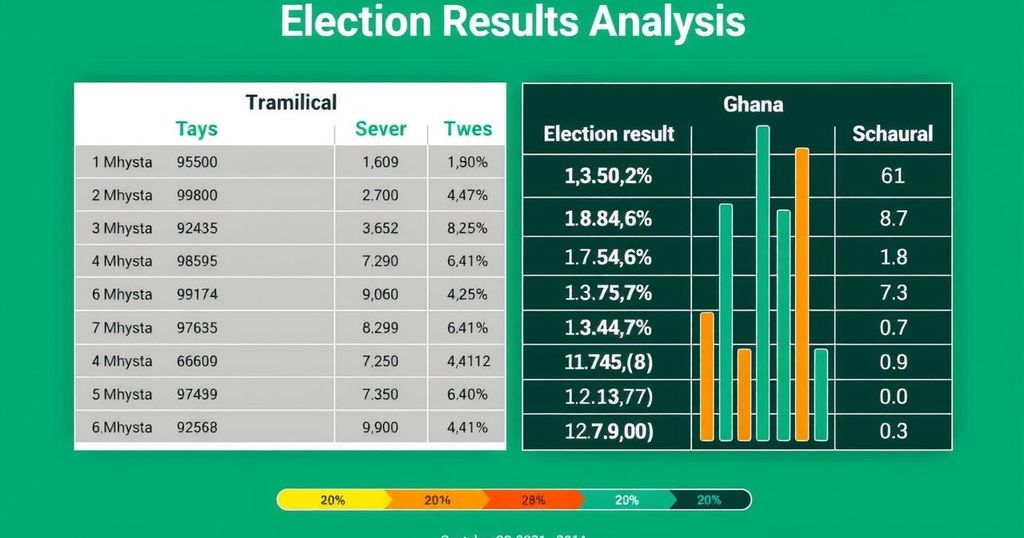Ghana’s 2024 Elections: The Fall of the NPP and Rise of the NDC

The 2024 Ghana elections marked a significant political shift as the ruling New Patriotic Party (NPP) was defeated by the opposition National Democratic Congress (NDC) led by John Mahama. The NPP’s attempt to ‘break the eight’ was curtailed by economic challenges, including record inflation, high unemployment, and widespread dissatisfaction among voters. These factors culminated in a substantial loss of parliamentary seats for the NPP, demonstrating that economic management remains pivotal to securing electoral support.
The pivotal outcome of Ghana’s 2024 elections has resulted in the defeat of the ruling New Patriotic Party (NPP) led by Nana Akufo-Addo and Dr. Mahamudu Bawumia by the opposition National Democratic Congress (NDC) under John Mahama. Historically, Ghanaian political parties face challenges with extended governance, as no party has maintained power for over eight years since the inception of the fourth republic in 1992. The NPP aimed to ‘break the eight,’ but dire economic conditions and widespread discontent among the populace led to their significant loss.
Voter dissatisfaction stemmed from an unprecedented economic crisis characterized by soaring inflation rates surpassing 54%, continuing high unemployment levels, and burdensome taxation. Numerous citizens reported a deteriorating cost of living, making basic necessities unaffordable. Political analysts noted that the NPP’s attempts to emphasize programs such as free senior high education and infrastructure development failed to resonate with voters amidst their economic struggles.
Analyses conducted before the elections indicated that public sentiment heavily disfavored the ruling party, a sentiment echoed by various political researchers who conducted extensive surveys. Many among the electorate felt disconnected from the government, perceiving it more as a burden than a benefit. Institutional corruption and rampant illegal mining further exacerbated public outrage, leading to protests and strident demands for accountability.
According to reports, the NPP lost significant parliamentary seats, including critical regions where they had traditionally held power, revealing a stark shift in voter allegiance toward the NDC. Historical voting patterns in regions such as Greater Accra and Western Regions indicated an undeniable trend towards opposition support, leading to wins for the NDC in traditionally NPP strongholds.
The ramifications of this electoral shift reflect broader trends within Africa, where several ruling parties have recently faced electoral losses, primarily due to economic difficulties, heightened corruption, and effective opposition coordination. Ghana stands as a critical case study of this dynamic, showcasing the immediate impact of economic management on political longevity.
The context of this shift in political power in Ghana stems from an entrenched history of electoral processes since 1992 when the country transitioned to a fourth republic. Ensuing democratic elections maintained a trend where no party exceeded an eight-year governance period. Current issues include rampant inflation rates leading to a 54% surge, a dire unemployment crisis, and an overwhelming public outcry concerning economic management, which universally affected the populace. Political analysts suggest that a confluence of economic mismanagement and ineffective response to public resentment has culminated in this election’s result.
In conclusion, Ghana’s 2024 election results highlight a critical juncture in the nation’s political landscape, underscoring the profound impact of economic performance on voter sentiment and electoral outcomes. The defeat of the NPP by the NDC amidst economic turmoil and governance challenges acts as a reminder for future administrations regarding the necessity of addressing citizens’ immediate concerns and grievances. As Africa witnesses a trend of electoral transitions due to similar circumstances, Ghana’s experience reinforces the importance of responsive governance.
Original Source: www.bbc.com








